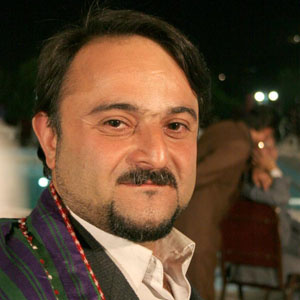A Hot Summer for Afghanistan

In the following months, Middle East will witness momentous presidential elections of two neighboring countries, Iran -the major challenge to West- and Afghanistan –forefront of West’s war against terrorism. The global community is determined to establish peace in Afghanistan, eradicate Talibanism and terrorism and steer Afghanistan’s traditional and tribal society towards democracy.
This year, seventeen million Afghans are eligible to vote for the presidential poll. With ethnic-religious composition of the Afghan society, outcome of the elections is the product of deals and agreements between different ethnic and religious groups. Mujahideen’s struggle over power after Soviet’s withdrawal, competition of neighboring countries etc. have complicated the elections in Afghanistan, probably making it the most difficult political poll to predict.
While Pashtuns, Tajiks, Hazaras and Uzbeks are the major ethnic groups in Afghanistan, the primary political and electoral competition is between first two. Other ethnic groups usually join either of these camps to form multi-ethnic coalitions for the elections.
Mujahideen are probably the most outstanding supra-ethnic political group. After years of battle and a failed attempt to rule the country in 1992, they entered Kabul as the Northern Alliance when U.S. overthrew Taliban in 2001. The militants have laid down arms since and entered the political scene, seeking their share of power. Their unreserved support for Karzai brought him landslide victory in the first presidential election of Afghanistan and their coalition in parliamentary elections brought Yunus Qanuni the post of parliament’s chairmanship.
However, disagreement between the legislative and the executive branches, disregard of Mujahideen’s demands by Karzai, dismissal of key Mujahideen figures from high-rank executive positions and replacing them with Afghans of pro-West inclinations, all spurred war veteran militants to form a new coalition, the National United Front. Headed by Burhanuddin Rabbani, the alliance also had Ahmad Zia Massoud (Ahmad Shah Massoud’s brother and Karzai’s first vice president), Marshal Fahim (Ahmad Shah Massoud’s successor in Northern Alliance and Karzai’s deputy in the interim government) and Yunus Qanuni as its foremost figures.
From the first days of its inception, the National United Front openly opposed Karzai’s policies and it was clear that the group is aiming the presidential seat. Interestingly, the party has endorsed an external figure, Abdullah Abdullah, the spokesman of Northern Alliance and veteran Mujahid as its candidate. The decision was not favored by their potential candidate, Marshal Fahim, and led to his withdrawal from the coalition.
Though having a Pashtun father, Abdullah is known as a Tajik for his maternal roots and his birth in Tajik-dominated region of Panjshir. According to the constitution, each presidential candidate should introduce his first and second vice presidents during the registration process of presidential elections. The general trend among presidential nominees is to attract votes of major ethnic groups, hence selecting their deputies from other ethnicities. Though Abdullah’s deputies aren’t known yet, most possibly they will be from Pashtun and Hazara figures.
Hamed Karzai has passed seven difficult years himself. Assassinations, terrorist attacks, unemployment, narcotics, afghans’ clashes with ISAF and NATO, Mujahideen’s demands for a bigger share of power etc. have all hurt his popularity, though his recent stance, e.g. on people’s protest against civilian casualties in NATO’s raids and approving Shiites’ personal status law have reconstructed his image. Some anti-Karzai propaganda however is disseminated by countries which have military presence in Afghanistan and attribute their failures to his inefficiency.
With problems between Karzai and his deputy Ahmad Zia Massoud and the latter’s move to the National United Front camp, Karzai –who has officially nominated for the elections-, should search for another first vice president. Expectedly, he will choose a Tajik for this position and chances for an agreement with Marshal Fahim are high. Speculations for his second vice president are running around though. The current holder of the office, Karim Khalili, a Shiite Hazara, is facing declining popularity, while still an appropriate option for Karzai and his team.
Zalmai Khalilzad, another possible candidate, has not made any remarks about joining the competition. However, the southern provinces of Afghanistan are witnessing the formation of headquarters in support for Karzai and distribution of finances among some tribes for organizing his campaign. Incumbent foreign minister the Tajik Dr. Spanta and Ehsanullah Bayat –president of Ariana Television Network are speculated to be his deputies.
Born from a Pashtun father and a Tajik mother in Mazar-e Sharif in 1951, Khalilzad graduated from Chicago University with a PhD degree on political science. Since gaining American citizenship he has served several administrative positions including State Department advisor on Soviet war in Afghanistan and Iran-Iraq War, head of the Bush-Cheney transition team for Defense Department, Special Assistant to the President and Senior Director for Southwest Asia, Near East, and North African Affairs at the National Security Council, United States’ Ambassador to Iraq, Afghanistan and the United Nations.
We have to wait and see what comes out of the critical elections of summer in Afghanistan. Will Tajiks seize power for the third time in Afghanistan’s history? Or as it has been the case in almost the entire history of Afghanistan Pashtuns will rule the country? Houman Dolati is an expert on Afghanistan affairs.

